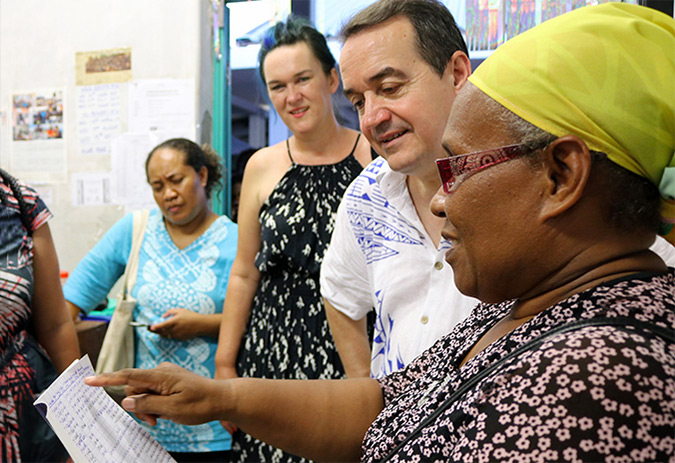Markets for Change addresses barriers to women’s economic empowerment in Solomon Islands
Date:
This week, the Government of Australia announced increased support to the six-year multi-country project, Markets for Change (dubbed M4C)—a UN Women project principally funded by the Australian Government, and implemented in partnership with UNDP. This innovative project aims to ensure that marketplaces in rural and urban areas of Fiji, Solomon Islands and Vanuatu are safe, inclusive and non-discriminatory, promoting gender equality and women’s economic empowerment.

Fifty-one-year-old Janet Ramo is the President of the Auki Market Vendors Association (MVA), in Solomon Islands’ largest market in Malaita Province, which is also a key site for UN Women’s Markets for Change project.
“With this project, I see myself as a business woman—I no longer look down on myself—I am happy,” said Ms. Ramo, speaking with UN Women Deputy Executive Director, Mr. Yannick Glemarec, who visited the Auki Market during his recent official visit to the Solomon Islands.
“Before, we struggled with saving – this was not part of our life and culture–but after the Markets for Change financial literacy training, I saw the benefits of saving and investing for my cooperative business,” Ms. Ramo explained, adding: “The MVA took the initiative to provide a safe way that was easy to practice in the market with savings and loans to see what works.”

Between 75 to 90 per cent of vendors working at Pacific marketplaces are women, and their earnings often make up a significant portion of the incomes of many low-income households. Despite this, women are often excluded from market governance and decision-making.
M4C works with stakeholders, service providers and the market vendors themselves to build and support inclusive, effective and representative advocacy groups; deliver appropriate services, training and interventions; ensure women’s voices are heard and taken into account for decision-making in the market; and to improve markets’ physical infrastructure and operating systems. The resulting economic successes benefit not only the women, but also their families, communities and the national economy.
The project has facilitated women’s leadership and participation in decision-making through Market Vendor Associations (MVA), which improve the working conditions for women by enabling them to be active agents of change and leaders in their markets and communities.
“This is a new concept for Solomon Islands,” elaborates Ms. Ramo. “There were no MVAs before Markets for Change; most decision-making positions were held by men and we never saw the benefits. Now they are seeing women as strong, it motivates me.”

In addition to facilitating the formation of Market Vendors’ Associations, and providing financial literacy training for vendors, the M4C project supports many other initiatives. For example, this is the first time that Auki Market has prepared disaster management plans.
In June 2017, M4C partnered with the National Disaster Management Office (NDMO), Malaita Provincial Government, market managers and vendors from Auki Market to develop a disaster response management (DRM) plan and action plan. These plans will ensure that vendors working in the markets have agreed strategies of what to do in preparation for, and during a disaster. This is particularly relevant in the context of the Pacific islands, where climate-induced disasters are on the rise.
According to the United Nations Office for the Coordination of Humanitarian Affairs (UNOCHA), the Asia-Pacific region is home to 84 per cent of people affected by natural disasters worldwide. During 2016, the region experienced 37 tropical storms and the impact of El Nino, which caused drought across many countries.
The Solomon Islands is particularly vulnerable to natural disasters, such as cyclones, tsunamis, floods and drought. It has a population of approximately 560,000 spread across 347 inhabited islands, which poses significant logistical, coordination and communication challenges during emergencies.
“Before, we did not have any Disaster Risk Management Plans [for the market]. Having this plan in place makes us feel safer because the DRM Plans will really help the market vendors to know what to do before, during and after disasters,” said Patson Ata, Auki Market Vendors Association Vice President.
“Statistically, women and children are 14 times more likely to die during a natural disaster than men,” elaborated Kristy Nowland, UN Women’s National Project Manager for Markets for Change Solomon Islands. “The development and implementation of a DRM plan will not only help to ensure that market vendors’ needs and issues are addressed, but it will also enhance women vendors’ capacity to prepare for disasters.”
Another key initiative supported by the M4C project in May 2017 was a three-day Food Safety and Hygiene training, facilitated by the Environmental Health Division under the Ministry of Medical and Health Services in Malaita Province.
“The training was an eye-opener for me,” said Alice O’ote’e, one of the 32 market vendors from Auki Central Market who successfully completed the training. “So many times we ignore the small things that can be done for food handling to make it safe and hygienic for our families, businesses and the general public. I've learned many things from the training and my aim is to put them into practice to improve my home, kitchen and my business in cake-making."
UN Women’s Markets for Change (M4C) project is a key component of its Women’s Economic Empowerment programme in the Pacific, and is principally funded by the Australian Government. This week, Australia co-signed an agreement with UN Women to provide approximately AUD 1 million in additional funding for 2017 – 2019.
For further information please visit:
http://fiji.unwomen.org
www.facebook.com/unwomenpacific
www.twitter.com/unwomenpacific